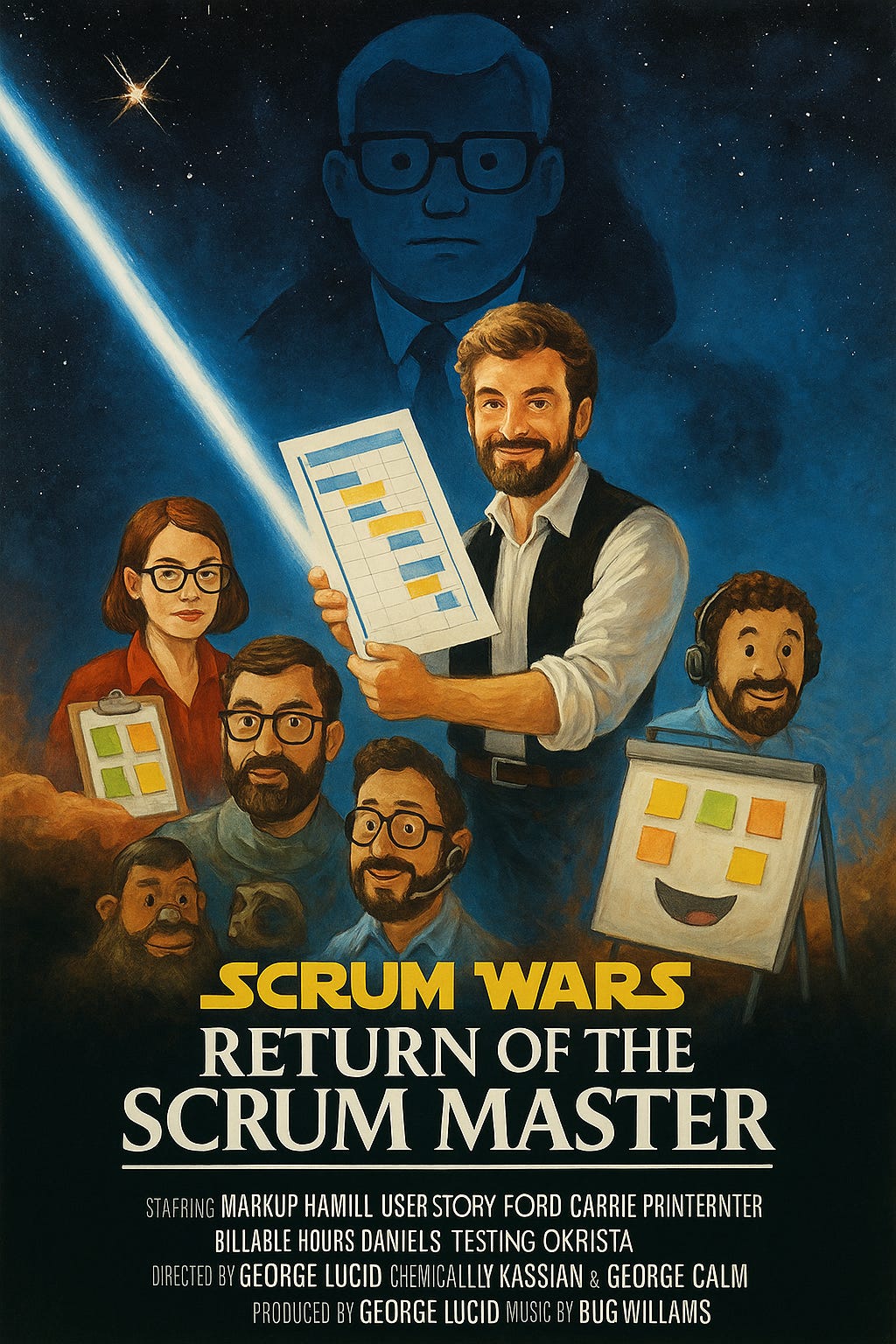The Return of the Scrum Master
What Happens After the Downfall of the Scrum Master Role?
Even the Scrum certification providers agree on the downfall of the Scrum Master role (oh wait I should say accountability before I piss someone off).
However, I disagree with the conclusion:
“To executives and organizational leaders contemplating or amid transformation: do not abandon the Scrum Master concept because of disappointing experiences. Instead, reassess your understanding of the role and your expectations.
Identify individuals with natural change agent abilities—those who demonstrate curiosity, empathy, courage, persistence, and systems thinking. Look for people who ask uncomfortable questions, who see patterns others miss, who build trust naturally, and who inspire others to grow.
These individuals, properly supported and developed, can become the orchestrators your digital transformation desperately needs. They can guide your teams and organization step by step through the challenging terrain of change.
The Scrum Master role hasn't failed—our implementation of it has. By recognizing and correcting these fundamental misalignments, we can restore the transformative power this role was always meant to wield.” - Hiten Shah, The Downfall of the Scrum Master Role
The Scrum Master role is the problem. It’s a fundamentally flawed concept. I hope and believe there will be no grand Scrum Master revival. This is it. The certification party is over, and Scrum will slowly fade away. There will be no resurgence of Scrum.
What problem does a Scrum Master solve?
Do you need a Scum Master for that?
And if you don't do Scrum, how would you solve those problems?
When I try to answer any of these questions, it never results in me giving a client the advice: hire more Scrum Masters.
Hiring more Scrum Masters usually means you are simply passing your problems along to someone who doesn't know how to solve your problems either.
It's even worse than incompetence, they usually are Scrum zealots too. They try to solve the problems while being boxed into the Scrum paradigm. They suffer from Scrum tunnel vision without considering or understanding the full picture.
Leaders, if anyone tells you the solution to your problems is to hire more Scrum Masters, then they don’t understand your problems all that well.
I hope there will be no Scrum Master resurgence because organizations don’t need Scrum Masters or Scrum to solve their problems.
Adopting Scrum together with Scrum Masters will usually result in turning better Scrum into a proxy for success.
We all know this is a lie, and that’s why we’re witnessing the downfall of the Scrum Master role. It’s time for something better than Scrum.




There's truth in both Hiten Shah's words and your own. There is one aspect of the scrum master role that is essential: that of a change agent. Organisations wishing to improve the way they work need someone to focus wholly on that improvement. Not on product, not on technology, not on people-management, only on improvement—in all its forms: personal, relational, environmental. Without such a person, who would hold the big picture there is a danger of local optimisation, and great disconnect. A good scrum master (there are painfully few) would focus on this. It may be better to rename the person who does this though, and separate it from Scrum. Scrum itself may be going down the drain, but don't throw the baby out with the bathwater!
I find the Scum framework incredibly compelling. It’s so simple and straightforward in its totality. You strategise, you plan, you execute, you inspect daily, you review the outcome, you review your practices, repeat.
There is something truely wonderful about how easy that concept is to grasp, and how almost universally this seems to be something we all can get behind.
Yet, we see time and again an application of Scrum often yields disfunction. We end up as the piece says, with zealots who stick to some text book definition. There is this lack of flexibility and adaptability which is wholly ironic, and when everything is Scrum nail all the problems need a Scrum hammer.
I’m a Project Manager, and I’m heavily leveraging what I’ve learned from my Scrum training. However I’m not banging on about Agile and Scrum. I’m picking the parts that work in our context (at least that I think work).
What I do not understand is, what parts of the process are broken. I can appreciate that perhaps, the Scrum Master role is too narrow. We don’t need a meeting facilitator on all our teams so to speak (slightly unfair to the role, but it’s typically how it plays out).
But do we not want teams to regularly iterate, to present working product, to get feedback, check alignment with the strategy, then carry on? What is the alternative?
That’s not a defence of Scrum or the Scrum Master role, that’s a philosophical one. Because the problem has been that organisations plan to death, thinking they are derisking, get caught in the contract game, and end up with massive cost blow outs and hopelessly late and cancelled projects.
So while we are saying fhe Scrum Master is dead, maybe we should say the Project Manager is dead too? Schedules are stupid, they never work. They give you a false sense of confidence, you spend endless hours updating them, only for you to roll your eyes knowing it’s a waste of time.
Scope documents are dumb too. We spending hours labouring over a scope document, feeling great about ourselves, knowing the whole time that there will be scope creep, the organisation will change and the environment will too. We know all of these documents will change. Yet the purpose of them is to draw boxes and say “that’s done”. But it’s clearly not, and everyone knows it.
So while we say agile is dead and Scrum is dead, tell us what problems still exist and what should be done?